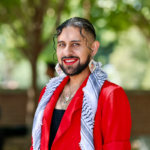May 2025
The views and opinions expressed in this blog are solely those of the author and do not necessarily reflect the official policy or position of Education Insights Center (EdInsights) or the California Education Policy Fellowship Program (EPFP).

Dr. Ángel de Jesus González (He/They/Elle), Assistant Professor of Higher Education Administration and Leadership at California State University, Fresno
Since February, the “Dear Colleague Letter” from the U.S. Department of Education has sparked national debate over the legality of affinity spaces in higher education. Amid this uncertainty, California stands firm with legislative support to sustain affirming spaces for marginalized students. As LAist recently reported, these conversations are intensifying during commencement season.“In California we have the backing of the Legislature and the governor vis-a-vis their funding allocations to do these types of affinity graduations,” states Dr. Eric Felix of San Diego State University. We echo this call-not to retreat, but to deepen our commitment to practices like Lavender Graduations.
Rainbow and Lavender Graduations are a growing practice at California Community Colleges. They are not simply alternative ceremonies, they are vital spaces of recognition and resistance for queer and trans students navigating institutions built around cisheteronormative norms. The harm these students face are embedded in everyday erasures: the need to repeatedly explain one’s name, pronouns, and lack of structures of support—compounding signals of not belonging. Lavender celebrations offer what traditional ceremonies often do not, a space where queer students are seen, celebrated, and affirmed in their fullness. Supporting these ceremonies is not about division, it’s about creating the space never given.
Assembly Bill (AB) 132

Jay Wiedenhoeft, Graduate Student, Higher Education Administration and Leadership, Fresno State University
California’s commitment to LGBTQ+ student success has been codified and funded through legislative efforts such as AB 132, Section 89, signed into law by Governor Gavin Newsom in 2021. AB 132 made a historic $10 million one-time investment into the California Community College (CCC) system to support LGBTQ+ initiatives, acknowledging that queer and trans students deserve more than passive inclusion—they deserve proactive investment. Through the California Community Colleges Chancellor’s Office (CCCCO), these funds have supported Safe Zone trainings, LGBTQ+ resource centers, queer and trans mental health services, visibility campaigns, and specifically, Pride and Lavender Graduations.
Affirming Spaces: The Data Are Clear
The need for affirming spaces like Lavender Graduations has never been greater. According to a national study by the Williams Institute at UCLA, LGBTQ+ people are significantly more likely to attend community college, with 33% of LGBTQ adults aged 18–40 having attended a community college. Yet they report disproportionately negative experiences:
- 75% of LGBTQ+ community college students were not out to teachers or staff.
- 19% experienced bullying, harassment, or assault—nearly three times the rate of non-LGBTQ peers.
- 32% were diagnosed with depression while attending community college, compared to 13% of their non-LGBTQ peers.
- Only 12% reported that their college offered LGBTQ-supportive counseling.

Carlos Lucatero, Graduate Student, Higher Education Administration and Leadership, Fresno State University
These realities reinforce what the California Community Colleges Chancellor’s Office (CCCCO) reported in 2024: LGBTQ+ students are more likely to experience food insecurity, housing instability, mental health challenges, and feelings of isolation than their peers. Colleges that used AB 132 funds for LGBTQ+ Centers and culturally affirming events, such as Lavender Graduations, saw measurable improvements in student engagement, sense of belonging, and academic success.
This funding does more than create programs, it reflects an ethos grounded in equity. AB 132 builds on earlier policies like AB 620 and AB 1018, legislation that established LGBTQ+ support as a matter of educational equity and civil rights. These measures, along with codifications in California Education Code Sections 78220 and 78222, make it clear that culturally affirming practices are not just allowed—they are a necessary part of student success.
Sense of Belonging and LGBTQ Student Success
Lavender Graduations; which honor the achievements of lesbian, gay, bisexual, transgender, queer, and non-binary students; embody a powerful commitment to affirmation. As Sano (2000) notes, they publicly celebrate the resilience of LGBTQ+ students, many of whom navigate added layers of isolation and systemic barriers. Sense of belonging is not just about comfort, it’s about being recognized and valued. My research on queer and trans students at california community colleges shows that even small signs of visibility, like rainbow stickers or posters, can significantly impact their feelings of safety and inclusion. These ceremonies are vital interventions that foster belonging, a key predictor of academic success.
In California, we are not required to dismantle DEIA or affinity-based initiatives; in fact, state policies actively support and mandate their continuation. In the face of growing national rollbacks, we must be careful not to over-comply out of fear and continue to co-create our own spaces of existence. Now more than ever, we must defend practices like Lavender Graduations. In the words of scholar-activist Gloria Anzaldúa, “we must perform visible and public acts that may make us more vulnerable to the very oppressions we are fighting against. But our vulnerability can be the source of our power—if we use it”. Lavender Graduations are one such act of visibility and vulnerability that generate collective strength.

